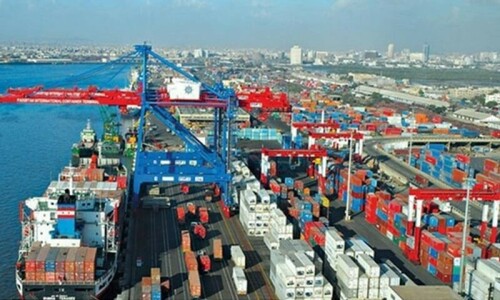PARIS: Oil prices may have rebounded off 12-year lows struck last month, but any hope for a broader recovery in the market would be misplaced, the IEA said on Tuesday, noting Opec is responsible for the latest glut of supplies on the market.
The International Energy Agency (IEA) said in its monthly report that “it is very hard to see how oil prices can rise significantly in the short term ... with the market already awash in oil...” On the contrary, it said “...the short term risk to the downside has increased”.
Crude prices collapsed from over $100 per barrel in July 2014 to under $30 last month on a slowdown in Chinese growth and as the Opec oil cartel stepped up output in an attempt to force out higher-cost production.
While low oil prices are usually good for oil consuming nations and global economic activity, investors have uncharacteristically in recent months begun to take the oil price as a proxy for economic demand, roiling global markets in volatility.
After the price for the main international oil contract struck a low below $28 last month, it rebounded to above $35 and now sits around $33.
But the IEA said “before victory over the bearish forces is declared we should look at the main factors driving the optimism”.
It then proceeded to debunk the factors driving the market higher, first among them the prospect of an agreement between Opec and non-Opec nations to cut output.
The IEA said “the likelihood of coordinated cuts is very low”.
OPEC GLUT: Another widely-held view in the market is that increases will slow in Opec production, except for Iran which is returning to the market after years of international sanctions, said the IEA.
But it pointed out that Iraqi production struck a new record in January and that there are indications Saudi Arabia has stepped up shipments.
The Paris-based IEA, with advises oil consuming nations on energy issues, noted that Opec is currently responsible for the glut of supplies hitting the market the past year.
While non-Opec production levels are roughly flat from one year ago, at 32.6m bpd in January, Opec supplies were up by 1.7m barrels per day (bpd) from a year earlier.
“It is Opec’s business whether or not it makes output cuts either in alone or in concert with other producers but the likelihood of coordinated cuts is very low,” said the IEA.
At current levels, Opec production means oil stocks are likely to increase further, it added.
Another driver of the recent bullishness in the crude market has been the view that that low oil prices will boost growth in demand.
Published in Dawn, February 10th, 2016












































